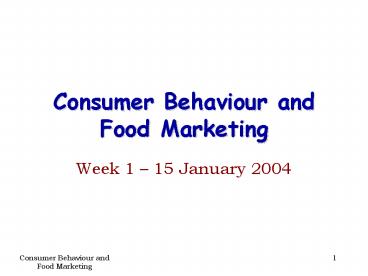Week 1 15 January 2004 PowerPoint PPT Presentation
1 / 30
Title: Week 1 15 January 2004
1
Consumer Behaviour and Food Marketing
- Week 1 15 January 2004
2
Consumer Behaviour Food Marketing (AE 613)
- Module convenor
- Mario Mazzocchi (Room 310 ext. 6484
m.mazzocchi_at_rdg.ac.uk) - Module is held on Thursday 11am-1pm in room AG
GU04
3
Module content
- Behavioural theories of consumer choice and
models of consumer decision-making process - Factors influencing consumer choice with respect
to foods - Implications of such factors for marketing of
food products
4
Learning outcomes
- The module aims at providing you with
- An understanding of the consumer decision-making
process - An understanding of internal and external
influences on consumer choice - An appreciation of the relevance of the consumer
choice process to food marketing - An understanding of how market research methods
relate to elements of the consumer
decision-making process
5
Module structure
6
Module assessment
- Coursework (50) Final exam (50)
- The assessment will take the form of a
presentation (20) essay (80) which relates
consumer behaviour to the marketing of food
products. - Choice among any of the topics covered in the
course - Max 2500 words
- Deadline 19 March 2004 (end WK20)
7
Presentation and Essay Development
- Presentation will start from week 4
- Essay questions are given (available on the web)
- Each week a 5-people team will give a short
Powerpoint presentation (20 minutes) - The presentation will originate the essay to be
delivered at the end of the course - Schedule of presentations
8
Presentation and essay writing basic guidelines
- Try to be concise and communicative
- Base your answers to essay questions on sources
given at the end of the lecture, but also make
use of library resources to research
independently - Use your own words to interpret sources through
a case study - All sources must be correctly referenced in the
text
9
Essay questions (1)
10
Essay question (2)
11
Essay question (3)
12
Suggested reading
- The course will be mainly based on the following
textbooks - East (1997). Consumer Behaviour Advances and
Applications in Marketing. London Prentice-Hall. - Further references will be given for each class.
A reading list is under preparation. - Food-specific books (in the Library)
- Marshall (1995, ed.). Food Choice and the
Consumer. London Blackie Academic Professional - Meiselman and McFie (1996, eds.). Food Choice,
Acceptance and Consumption. Blackie Academic
Professional
13
Consumer Behaviour (East)
- How and why people buy and use products
- How they react to prices, advertising and other
promotional tools - What underlying mechanisms operate to help and
hinder consumption
14
Some consumer behaviour concepts an example
- Information processing
- How do we process a TV advert?
- Salient attributes
- The two things we look for in a product
- Unique selling property
- An advert should focus on a single product
characteristics which makes it preferable to
other - Value-expressive influence
- The desire to conform to a social group
- Cultural influence
15
Look at the advert shown and identify
- The attributes that you consider as important in
this product (salience)1 ______________ 2
______________ - What is the unique selling proposition of the
advert? ______________________ - Which social group/culture is exploited as a
value-expressive influence? _________________
16
The TV AD
17
Reserve solution
18
Other issues
- Who is the target of the advert?
- Age
- Sex
- Education level
19
Other consumer behaviour aspects
- Attitudes, beliefs and behaviour
- Buying environment
- Quality and complaints
20
Disciplines in consumer behaviour
- Sociology
- Psychology
- Marketing
- Economics
21
Food plays a central role in peoples lives
- Food preferences are culturally bound and
socially influenced - Source of nutrition
- Source of hedonistic experience
- Social function
- Cultural function
- Central economic role
- Complexity
- Multidisciplinary approach
22
Economic FactorsMicroeconomic theory
- Demand is a function of prices, income and
preferences - but preference changes are
difficult to measure - Effects of income and price changes on demand,
under given preferences - Unresolved issue quality and preferences
23
The Engel Law
- As income grows, the household expenditure share
for food decreases - Share not quantity
- Saturation of food consumption
- Healthy foods
- Functional foods
- Marketing and differentiation (product bundle)
24
Food share on Italian household expenditure
Exp. share for food ()
Total expenditure
25
Real value of food consumption
26
But ...
- How do preferences form?
- Why do they change?
- How are decisions made?
- Do income and prices influence preferences too?
- These questions are central to marketing
strategies - How can consumer decisions be influenced?
27
Long-term change of consumer preferences
28
Foods for which consumption has changed
(1990-2000, NFS)
29
Food properties and quality (Hooker, Caswell,
1996)
30
(No Transcript)

